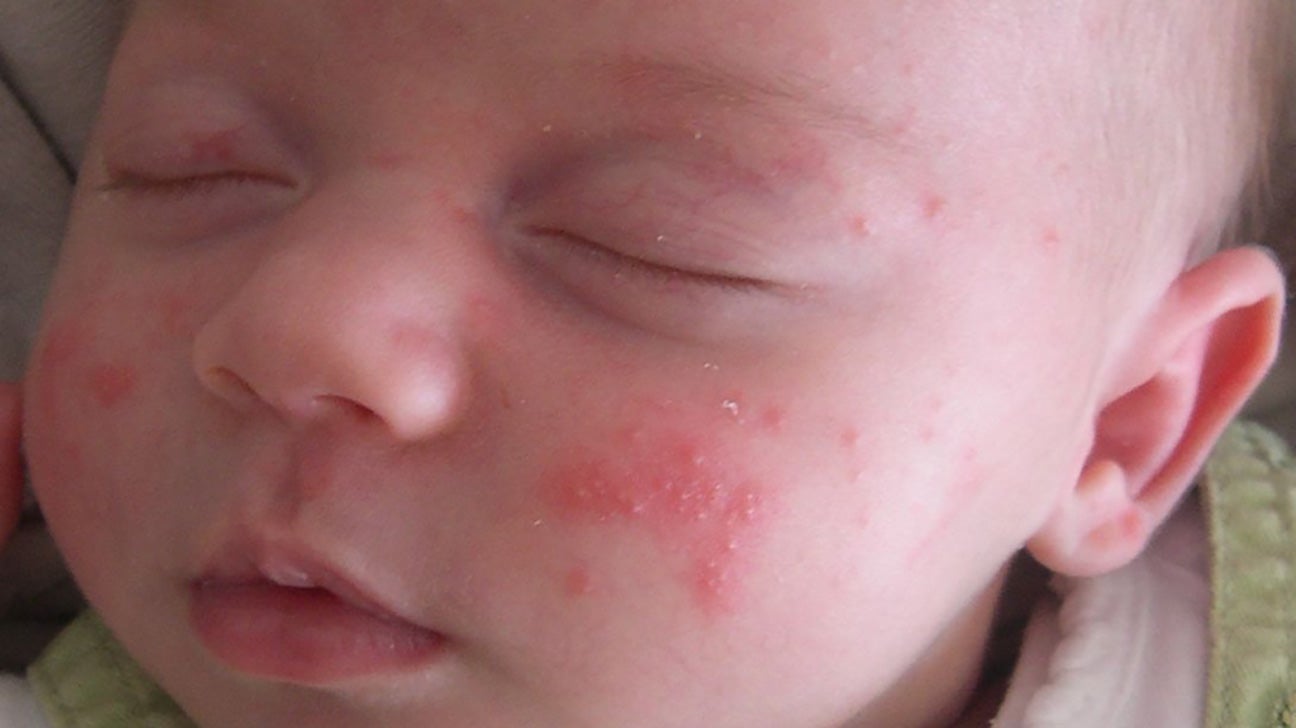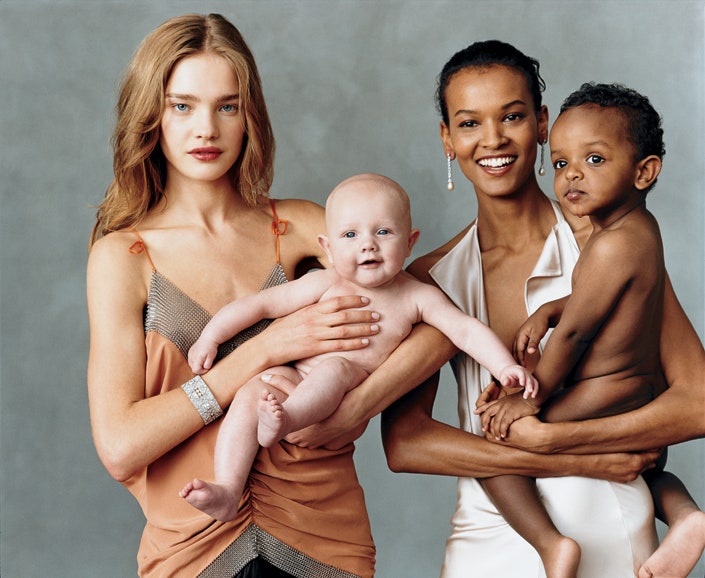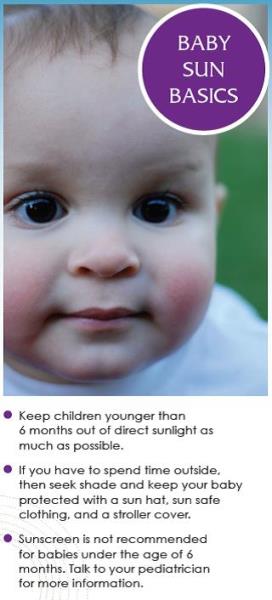Baby acne and eczema are not related. They are distinct conditions with different causes and treatments.
Baby acne usually appears on the cheeks, nose, and forehead. It looks like small red or white bumps and typically resolves on its own within a few weeks. Eczema, also known as atopic dermatitis, manifests as red, itchy, and inflamed patches on the skin.
It can be chronic and may require ongoing treatment. Understanding the differences between these conditions helps in providing the right care for your baby’s skin. Proper diagnosis and treatment from a pediatrician ensure that your baby’s skin remains healthy and comfortable. Regular moisturizing and gentle skincare routines can also support overall skin health.
:max_bytes(150000):strip_icc()/GettyImages-168516611-068c991d63114058a17c235b293667dc.jpg)
Credit: www.verywellhealth.com
What Is Baby Acne?
Baby acne is a common skin condition in newborns. It appears within the first few weeks of life. Baby acne looks similar to teenage acne. The skin shows small, red bumps or pimples. It usually clears up on its own.
Symptoms And Appearance
Baby acne often shows up on the cheeks, nose, and forehead. It can also appear on the scalp, neck, back, or chest. The pimples are red or white and surrounded by reddish skin. Sometimes, the skin may feel rough to the touch.
- Small red or white bumps
- Appears on cheeks, nose, and forehead
- May spread to scalp, neck, back, or chest
- Reddish skin around the pimples
- Rough texture
Causes And Triggers
The exact cause of baby acne is unknown. Experts believe it may be due to maternal hormones. These hormones pass to the baby before birth. Another possible cause is the baby’s sensitive skin reacting to the environment.
Several triggers can worsen baby acne:
- Heat and humidity
- Saliva or spit-up
- Rough fabrics
- Overly oily skin products
Baby acne does not require treatment. It usually clears up within a few weeks. Keeping the baby’s face clean can help. Use mild soap and water. Avoid using oily lotions or harsh products.

Credit: www.medicalnewstoday.com
What Is Eczema?
Eczema is a common skin condition, especially in infants and young children. It causes the skin to become red, itchy, and inflamed. This condition can be uncomfortable and sometimes painful. Understanding eczema is key to managing it effectively.
Symptoms And Types
Eczema presents itself in various ways. Here are the main symptoms and types:
- Red patches: These are the most common symptoms.
- Itching: The skin becomes very itchy and uncomfortable.
- Dry skin: The affected areas often feel dry and rough.
- Swelling: Some parts of the skin might swell.
There are several types of eczema:
- Atopic dermatitis: This is the most common type.
- Contact dermatitis: Caused by contact with irritants.
- Dyshidrotic eczema: Results in blisters on hands and feet.
- Nummular eczema: Characterized by round, coin-shaped spots.
- Seborrheic dermatitis: Often affects the scalp and face.
Common Triggers
Various factors can trigger eczema flare-ups. Knowing these triggers helps in avoiding them:
| Trigger | Description |
|---|---|
| Allergens | Dust mites, pet dander, and pollen can trigger eczema. |
| Weather | Cold, dry air and hot, humid conditions worsen symptoms. |
| Stress | Stress can make eczema symptoms worse. |
| Soaps and Detergents | Harsh soaps and detergents can irritate the skin. |
| Clothing | Wool and synthetic fabrics can cause irritation. |
Understanding and avoiding these triggers can help manage eczema effectively. Consult a healthcare provider for personalized advice.
Differences Between Baby Acne And Eczema
Parents often worry when they see red spots on their baby’s skin. Baby acne and eczema are common skin conditions. Both look similar but have different causes and treatments. Understanding the differences helps in proper care.
Physical Characteristics
Baby acne appears as small, red or white bumps. It usually occurs on the cheeks, forehead, and nose. The skin around the bumps may be slightly red.
Eczema, on the other hand, shows up as red, dry, and scaly patches. These patches may ooze or crust over. Eczema can also cause intense itching, making the baby uncomfortable.
| Condition | Appearance |
|---|---|
| Baby Acne | Small red or white bumps |
| Eczema | Red, dry, scaly patches |
Affected Age Groups
Baby acne often appears in newborns. It typically shows up within the first month. Most cases resolve by the time the baby is three months old.
Eczema can start as early as six months. It may continue into childhood or even adulthood. Babies with a family history of allergies are more prone to eczema.
- Baby Acne: Affects newborns, resolves by three months.
- Eczema: Starts at six months, can last into adulthood.
Similarities Between Baby Acne And Eczema
Baby acne and eczema often confuse parents due to their similar appearances. Both conditions affect infant skin, causing redness and irritation. Understanding their similarities can help in identifying and managing them effectively.
Possible Overlapping Symptoms
- Both conditions cause red, inflamed skin.
- They can appear as tiny bumps on the baby’s face.
- Itchiness is common in both baby acne and eczema.
- Dry patches may be present in both conditions.
Impact On Infant Skin
Baby acne often appears on the cheeks, nose, and forehead. It usually occurs within the first few weeks after birth.
Eczema can appear anywhere on the body. It often shows up on the cheeks, arms, and legs. Eczema may last longer and can be more widespread than baby acne.
| Condition | Common Areas | Duration |
|---|---|---|
| Baby Acne | Cheeks, nose, forehead | Few weeks |
| Eczema | Cheeks, arms, legs | Often longer-lasting |
Both conditions can cause distress for infants and parents. Keeping the baby’s skin clean and moisturized can help manage symptoms. Consult a pediatrician for any persistent or severe skin issues.
Potential Connections
Exploring the potential connections between baby acne and eczema can provide insights for parents. Understanding these connections can help in managing these conditions effectively. This section delves into the possible links, focusing on genetic factors and environmental influences.
Genetic Factors
Genetics play a significant role in both baby acne and eczema. If parents have a history of acne or eczema, their baby might also develop these conditions.
Studies show that babies with a family history of eczema have a higher chance of developing it. Similarly, babies can inherit the tendency for acne from their parents.
Here is a table summarizing genetic factors:
| Condition | Genetic Influence |
|---|---|
| Baby Acne | High if parents had acne |
| Baby Eczema | High if parents had eczema |
Environmental Influences
Environmental factors can trigger or worsen both baby acne and eczema. These factors include:
- Temperature: Extreme heat or cold can affect the skin.
- Humidity: High humidity can cause skin irritation.
- Allergens: Dust, pollen, and pet dander can trigger eczema.
- Skin Products: Harsh soaps and lotions can irritate baby skin.
Managing these environmental factors can help reduce the severity of both conditions. Parents should be aware of their baby’s reactions to different environments and products.
Treatment Options
Parents often find baby acne and eczema confusing and concerning. Both conditions affect infants’ delicate skin but require different treatments. Understanding the specific remedies and management strategies can help keep your baby’s skin healthy and comfortable.
Baby Acne Remedies
Baby acne is common and usually harmless. It often clears up on its own. Here are some effective remedies:
- Gently clean your baby’s face with warm water daily.
- Avoid using oily or greasy skincare products.
- Pat the skin dry instead of rubbing it.
- Use a mild, fragrance-free soap if needed.
- Keep your baby’s skin hydrated with a gentle moisturizer.
If the acne persists for more than a few weeks, consult a pediatrician. They may recommend a safe topical treatment.
Eczema Management Strategies
Eczema can cause itchy and inflamed skin. Managing eczema involves keeping the skin moisturized and reducing irritants. Here are some strategies:
- Apply a thick, fragrance-free moisturizer several times a day.
- Use hypoallergenic and fragrance-free products.
- Dress your baby in soft, breathable fabrics.
- Keep your baby’s nails trimmed to prevent scratching.
- Use a humidifier to maintain moisture in the air.
- Give your baby a short, lukewarm bath daily.
If eczema becomes severe, a pediatrician may suggest a prescription ointment or other treatments.
| Condition | Remedies |
|---|---|
| Baby Acne | Daily gentle cleansing, avoid oily products, pat dry |
| Eczema | Frequent moisturizing, hypoallergenic products, soft fabrics |
When To Seek Medical Advice
Parents often wonder about the differences between baby acne and eczema. Knowing when to seek medical advice is crucial. This section helps parents identify symptoms that need expert attention.
Warning Signs
Not all skin issues require a doctor’s visit. However, certain warning signs should not be ignored:
- Severe redness or swelling
- Yellow crusts or oozing
- Persistent rashes lasting more than a week
- Fever alongside skin symptoms
- Rapid spreading of the rash
Consulting A Pediatric Dermatologist
If you notice any warning signs, it’s time to consult a pediatric dermatologist. Here’s what to expect:
| Step | Description |
|---|---|
| Initial Consultation | Discuss symptoms and medical history. |
| Physical Examination | Doctor examines the skin closely. |
| Diagnosis | Identify if it’s acne, eczema, or another issue. |
| Treatment Plan | Prescribe medications or suggest skincare routines. |
Early diagnosis can prevent complications. Always err on the side of caution and seek professional advice when unsure.

Credit: www.reddit.com
Frequently Asked Questions
Is Baby Acne Linked To Eczema?
Baby acne and eczema are not directly linked. Baby acne is temporary and caused by maternal hormones. Eczema is a chronic skin condition.
Are Eczema And Acne Linked?
Eczema and acne are not directly linked. Eczema is a chronic skin condition, while acne is caused by clogged pores. Both can coexist but have different causes and treatments. Always consult a dermatologist for accurate diagnosis and treatment options.
What Are Eczema Triggers In Babies?
Eczema triggers in babies include allergens, irritants, heat, and stress. Common allergens are dust mites, pet dander, and pollen.
Does Baby Acne Mean Allergies?
Baby acne does not typically indicate allergies. It usually results from hormones passed from mother to baby. Consult a pediatrician if concerned.
What Causes Baby Acne?
Baby acne is caused by maternal hormones. These hormones stimulate oil glands, leading to acne on the baby’s skin.
Conclusion
Understanding the differences between baby acne and eczema is crucial for parents. Proper diagnosis ensures effective treatment. Always consult a pediatrician for accurate advice. Early intervention can prevent discomfort and complications. Keep your baby’s skin clean and moisturized to promote healing and comfort.
Stay informed to provide the best care for your little one.


